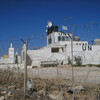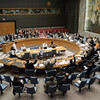
Four-year-old Qana survivor's night between the dead
Beirut 31 July 2006
Three of my colleagues went to Tyre today. I will spare you the details of what they saw and wrote. There’s only one thing that I need to share with you. Saada went to Jabal Amel hospital where she found a four year old boy, Hassan Chalhoub, who had spent the previous night in the morgue between the dead. He had been sleeping next to his sister, six-year-old Zeinab, in the shelter in Qana. There with him were his mom and his dad, who’s confined to a wheelchair. Many of the people of Qana are survivors of the 1996 massacre, when 110 people were killed and more than 100 were injured when by Israeli raids on civilians who had sought shelter in a nearby UN base. Thus, many of the people of Qana have special needs. Read more about Four-year-old Qana survivor's night between the dead








